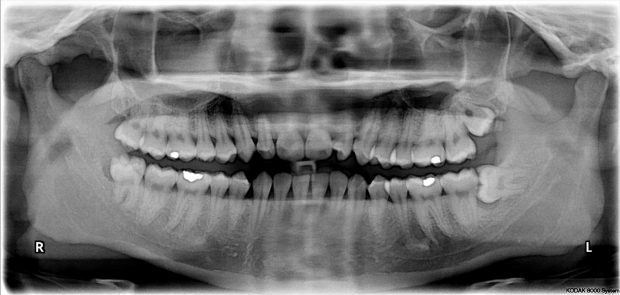
Wisdom teeth, also called third molars, are teeth that appear in the back of the mouth during your late teens or early twenties. Wisdom teeth probably evolved to replace teeth that had been worn away by chewing and grinding. Today, though, people have access to modern dentistry and do not need wisdom teeth to replace older teeth. In fact, it often makes sense to remove wisdom teeth as they may cause problems.
Why Are Wisdom Teeth Removed?
WebMD cites several reasons why wisdom teeth may need to come out.
First, wisdom teeth may grow in crooked and crowd existing teeth, pushing them out of line and making it more difficult for you to chew and bite.
Another reason to remove wisdom teeth is to prevent damage to the surrounding gums. Because wisdom teeth appear far in the back of the mouth, you may find it hard to brush and floss them adequately. This allows bacteria to flourish. The bacteria can lead to cavities in the teeth and inflammation of the gums. It may even lead to infected pouches of tissue called cysts.
Wisdom teeth may also become impacted or trapped under bone and tissue. Impacted wisdom teeth can cause pain or infection.
The emergence of wisdom teeth can also cause sinus problems such as congestion and pain.
Do I Need to Have My Wisdom Teeth Removed?
Some people do not develop wisdom teeth at all. There are also times when wisdom teeth grow in without causing any of the problems discussed above.
If you have wisdom teeth and they are causing pain, swelling or odour, you should talk with your dentist about having them removed.
Even if you don’t have any symptoms, your dentist will probably want to take x-rays to make sure that the wisdom teeth are not impacted and that they are not growing in at an unusual angle.
When Should I Be Evaluated for Wisdom Teeth Problems?
No matter what your age, you should have a dentist evaluate your wisdom teeth if you start to develop uncomfortable symptoms. Otherwise, it’s a good idea to ask for a full dental evaluation, including x-rays, when you are around 20 years old. The earlier that problem wisdom teeth are removed, the easier the procedure will be.
Preparation for Wisdom Teeth Removal
Before your wisdom teeth are removed, you will meet with an Oral Surgeon for a consultation. He or she will examine your mouth and review any x-rays or other imaging studies that have been taken. The surgeon will also want to know about your medical history including any medications you are taking. This meeting is a good time to bring up any questions or concerns you have about the procedure.
On the day your wisdom teeth are to be removed, your surgeon may ask you to avoid eating or drinking anything after midnight. This is especially true if you will be receiving general anesthesia or heavy sedation.
Your surgeon may ask you to take medications such as sedatives or pain relievers prior to your procedure. You will also need to arrange transportation to and from your appointment.
How Are Wisdom Teeth Removed?
The first thing the surgeon will do is inject medication into your gums to numb the wisdom teeth and the surrounding tissues. After the infections, you should not feel any pain during the procedure.
Once the area is numb, the surgeon will carefully remove any tissue or bone covering the tooth. This may require one or more incisions.
The surgeon then rocks the tooth back and forth to loosen it. You will feel pressure during this part of the procedure, but if you feel actual pain, let the surgeon know at once. He or she can inject more anesthetic. In some cases, the surgeon may cut the tooth into sections to make it easier to remove.
After loosening the tooth, the surgeon will remove it. If the surgeon did have to make an incision, he or she will put in a few stitches to help the wound heal faster. These stitches do not need to be removed. They will dissolve on their own in a few days.
After the procedure is over, the surgeon may ask you to bite on a piece of gauze to help with the formation of a blood clot.
The entire procedure takes about 45 minutes. You will probably be able to return to your regular routine within a few days.
Managing Dental Anxiety
If you are nervous or phobic about dental procedures, talk to your surgeon. He or she will be able to offer you different options.
First, you may elect to receive nitrous oxide, better known as laughing gas. Nitrous oxide is administered through a mask that fits over the nose. It helps promote relaxation. Some people even fall into a light sleep while they are breathing the gas. One benefit of nitrous oxide is that its effects fade as soon as the mask is removed.
Another option is to take an oral medication to ease anxiety. If you want to go this route, your surgeon will give you a prescription which you can fill at the pharmacy of your choice. You will take the medicine an hour or two before the procedure.
Finally, your surgeon may offer IV sedation, a medication that is administered through a vein in your arm. IV sedation puts you into a deeper state of sleep than the other two options. In fact, you may not even remember most of the procedure.
Recovery from Wisdom Tooth Removal
According to Colgate, which offers a dental advice website, you can expect to experience some swelling, bruising and discomfort for a few days to a week or two after wisdom teeth removal. You may also notice the taste of blood in your mouth.
In the first couple of days after the procedure, be careful not to dislodge any blood clots that have formed. Avoid brushing or flossing for at least 24 hours. You can clean your mouth by rinsing with salt water. Stick to cool, soft foods, and avoid drinking liquids through a straw.
Ease the pain and swelling by holding a cool washcloth or an ice pack against your jaw. Your surgeon may prescribe pain medication to help you get through the first days after the procedure. Over-the-counter pain medications such as Tylenol or ibuprofen can also help relieve discomfort.
Follow up with your surgeon if your symptoms do not improve or if they get worse.
Nobody looks forward to undergoing wisdom teeth removal, but if your wisdom teeth are causing you pain or if they are damaging your gums or other teeth, removal might be your best option. Talk to your dentist or a dental surgeon to evaluate your options. Remember, wisdom tooth removal is not as daunting as it sounds. You can get it over with and be back to your old self again in the matter of a few days.









![Daily Bite [Make]: Philly Cheesesteak Stuffed Bell Peppers](https://dashofwellness.com/wp-content/uploads/2013/01/Philly-Cheesesteak-Stuffed-Pepper-Daily-Bite-1-100x70.png)
